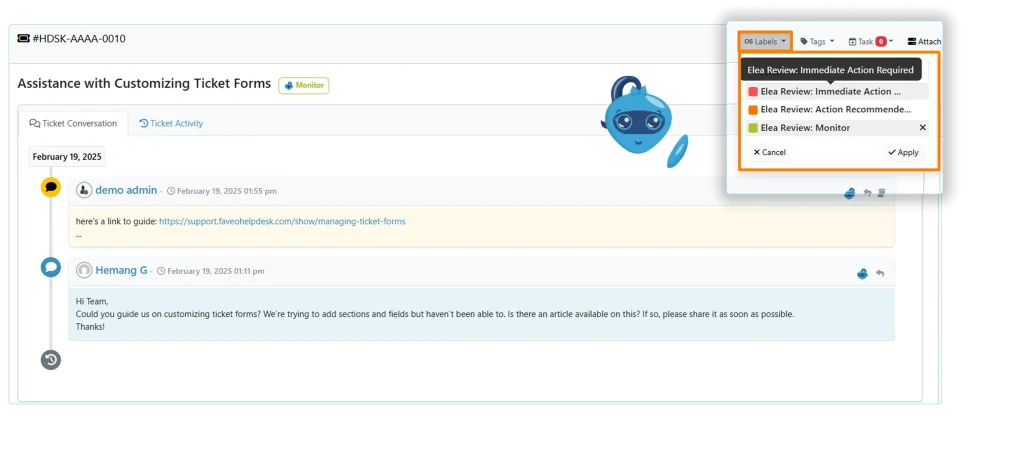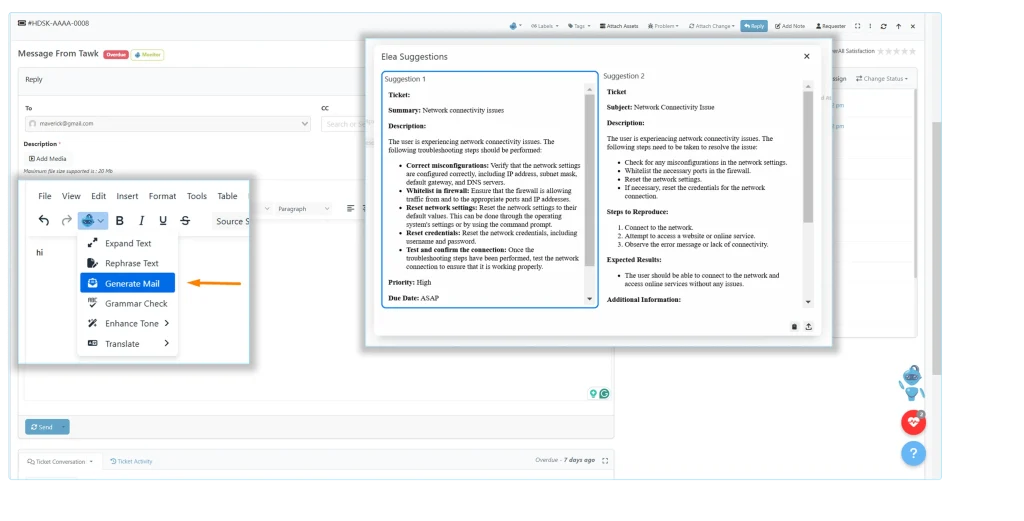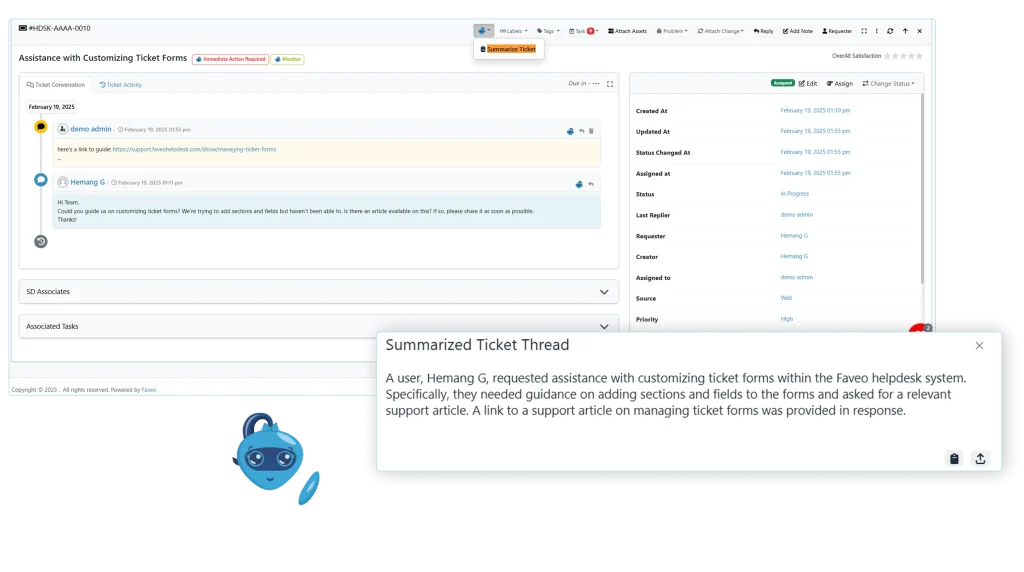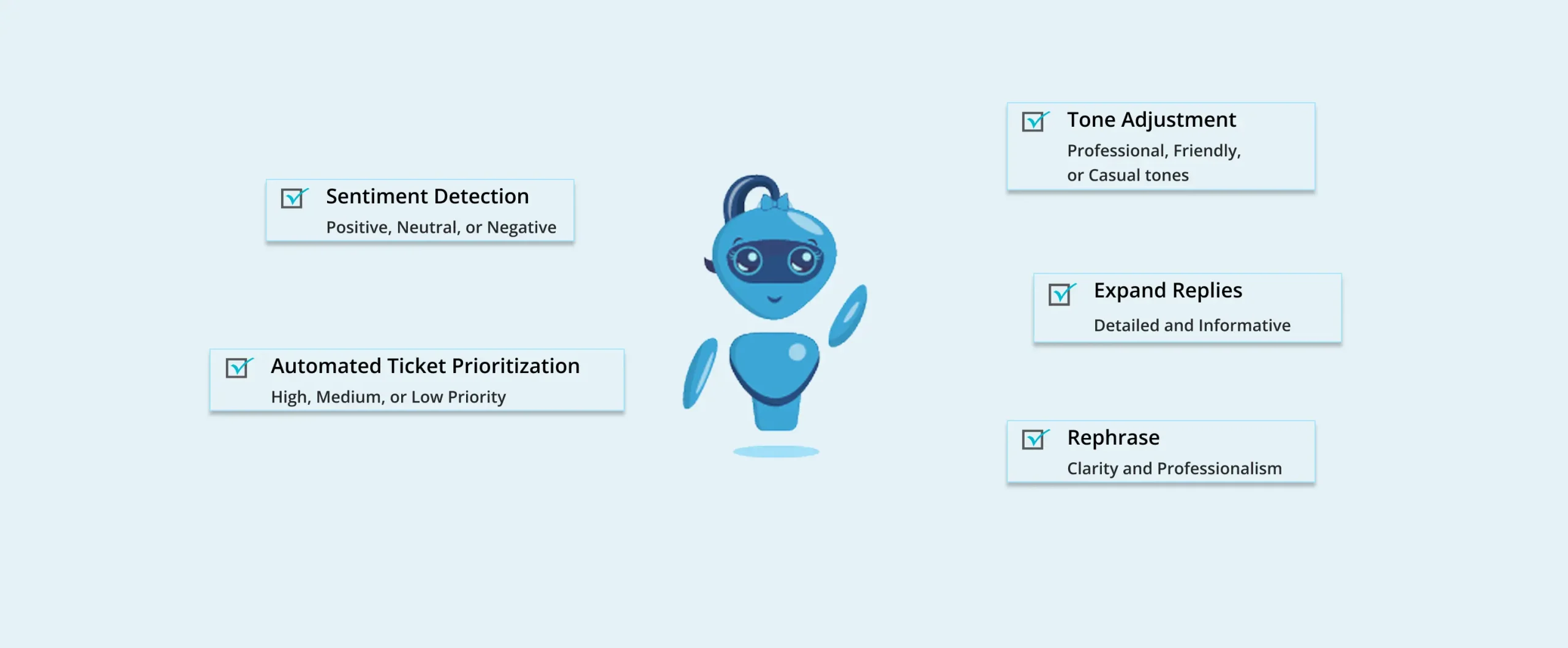Customer support is a critical component of success for any business in today’s fast-paced corporate world. Conventional helpdesk solutions can no longer suffice to cater to the increasing needs of today’s customers. That’s where artificial intelligence (AI) comes into play – a game-changer that increases efficiency, shortens response time, and provides better customer experiences.
Businesses that incorporate Faveo Helpdesk and other contemporary support platforms can tap the potential of AI to make repetitive tasks automation, workflow optimization, and let the customer care team work on challenging issues and not routine inquiries. AI-powered applications, such as Faveo Helpdesk, are transforming the world of helpdesks by adding brains to automation.
Let’s dive deeply into ten ways of utilizing AI to have a smarter helpdesk software.
1. Automating Ticket Categorization and Routing

Helpdesks powered with AI can be able to efficiently sort and auto-assign the tickets to the appropriate agent as per urgency, subject, or past interactions. Rather than adopting manual sorting, AI algorithms dig into customer inquiries and direct them to the apt department or representative.
For instance, Faveo Helpdesk can integrate AI-driven workflows that detect the nature of customer requests and automatically assign them to a support representative with the appropriate expertise, reducing delays and improving efficiency.
2. AI Chatbots for Instant Responses

AI chatbots are becoming indispensable in helpdesk software. These virtual assistants can handle routine inquiries, resolve basic issues, and provide 24/7 support without human intervention.
With AI-driven chatbots such as Elea AI, companies can provide instant responses to regular questions to customers, minimizing waiting times and maximizing customer satisfaction. These bots also have the capability to escalate intricate issues to human agents when needed, providing hassle-free support.
3. Sentiment Analysis for Customer Interactions
Recognizing customer emotions is essential to providing great support. AI-driven sentiment analysis software can read customer messages, emails, and chats to identify whether a customer is content, annoyed, or upset.
Helpdesk solutions such as Faveo Helpdesk can utilize AI sentiment analysis to highlight negative feedback, alert for issues that need to be addressed immediately, and offer agents contextual information to enhance customer interactions.
4. AI-Powered Knowledge Base and Self-Service
A well-structured knowledge base allows customers to find answers without contacting support. AI can enhance this self-service experience by offering personalized suggestions based on user behavior and past interactions.
For instance, AI-driven search engines can predict what customers are looking for and direct them to relevant articles, FAQs, or troubleshooting guides. This reduces ticket volume and empowers users to solve problems independently.
5. Predictive Analytics for Proactive Support
AI makes predictive analytics possible, enabling helpdesks to anticipate problems ahead of time. Based on historical data, AI can forecast customer pain areas and suggest solutions in advance.
For instance, Faveo Helpdesk can utilize AI-based insights to detect repetitive technical errors, alert customers beforehand, and offer preventive solutions, enhancing overall service efficiency.
6. AI-Based Email and Ticket Summarization


Agents tend to spend a lot of time reading long email threads and customer messages. AI can summarize emails and support tickets by pulling out key information, allowing agents to understand the problem at a glance without having to read the whole conversation.
With AI-based summarization software such as Elea AI, support teams can handle tickets more quickly, resulting in faster resolution and improved time management.
7. Smart SLA Management
Service Level Agreements (SLAs) play a vital role in upholding customer trust. AI can track SLA compliance in real-time and alert authorities when deadlines are likely to be violated.
For example, Faveo Helpdesk can incorporate AI-driven SLA monitoring to review ticket progress and alert managers when critical tickets require prompt attention, guaranteeing compliance and customer satisfaction.
8. Automated Response Suggestions
AI can aid helpdesk agents by providing suitable responses to customer questions based on past history and previous resolutions. This saves agents’ time in composing replies and provides consistency in communication.
Tools such as Elea AI can provide real-time response suggestions, allowing agents to resolve multiple tickets without sacrificing quality.
9. Voice and Speech Recognition for Improved Support
Artificial intelligence -driven voice recognition technology is revolutionizing customer support by making voice-based interactions possible. Speech-to-text functionality enables AI to record customer calls, interpret spoken questions, and offer real-time solutions.
For companies that employ Faveo Helpdesk, incorporating AI voice assistants can make it easier and enhance the customer support experience, particularly for customers who prefer voice communication to typing.
10. Ongoing Learning and Enhancement with AI
One of the greatest strengths of AI is that it can learn from interactions and get better with time. Machine learning algorithms scan support data, detect inefficiencies, and optimize workflows for improved performance.
For instance, AI in Faveo Helpdesk can evaluate customer feedback and agent performance and offer suggestions for process optimization and training. This ensures that the helpdesk adapts to evolving customer needs.
Final Thoughts
AI is no longer science fiction; it’s already impacting how companies manage customer support. With AI-enabled features, organizations utilizing Faveo Helpdesk and other helpdesk solutions can improve efficiency, lower expenses, and provide better customer experiences.
From AI-powered ticket classification to predictive analysis and AI chatbots such as Elea AI, AI-based helpdesk solutions are creating new standards in customer support. With these technologies, companies are not only able to automate their support processes but also get an edge over competition in the current digital era.
The future of helpdesk software is AI-driven, and organizations that adopt this change will certainly experience improved customer satisfaction, faster response times, and greater operational efficiency.


